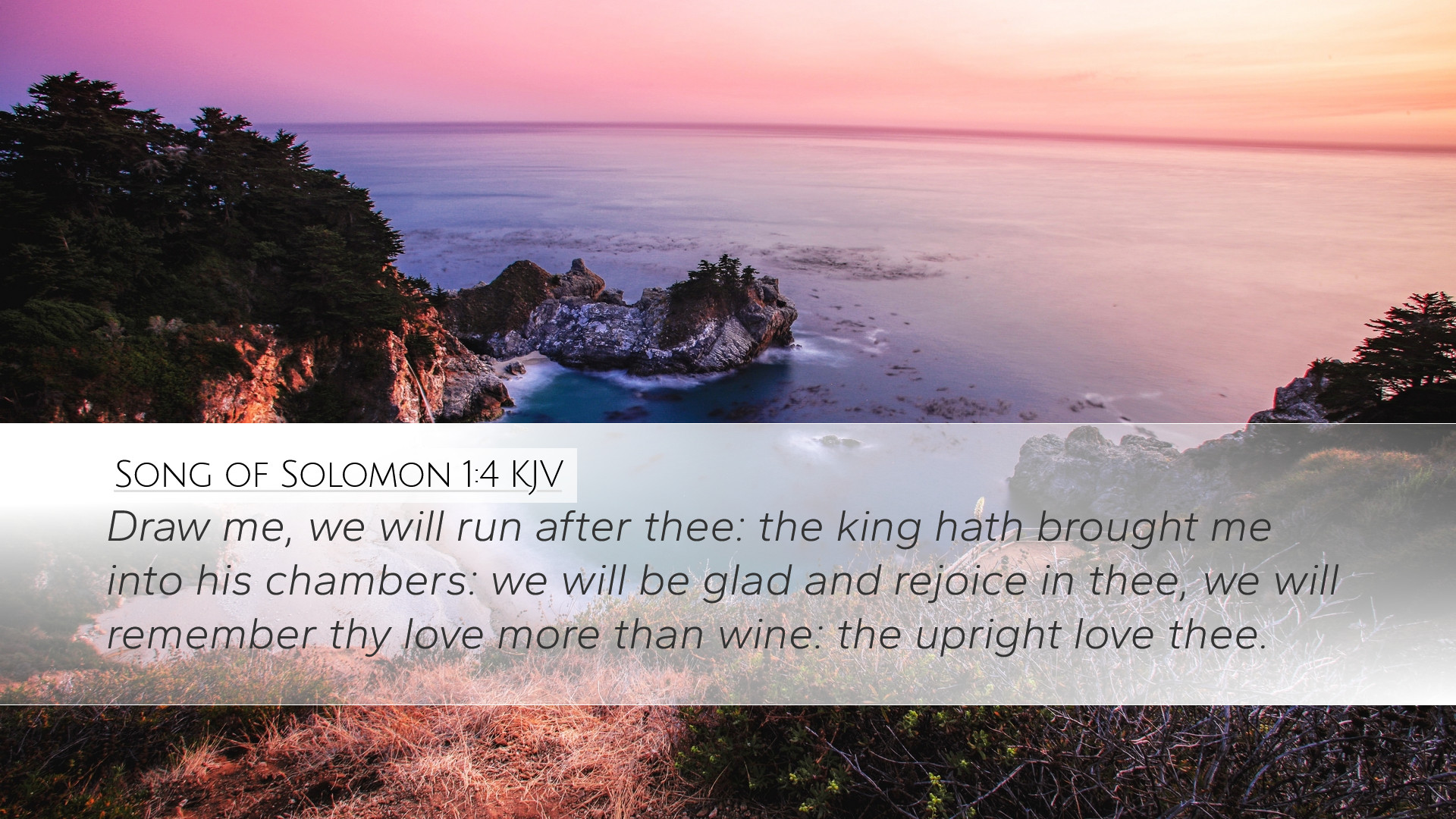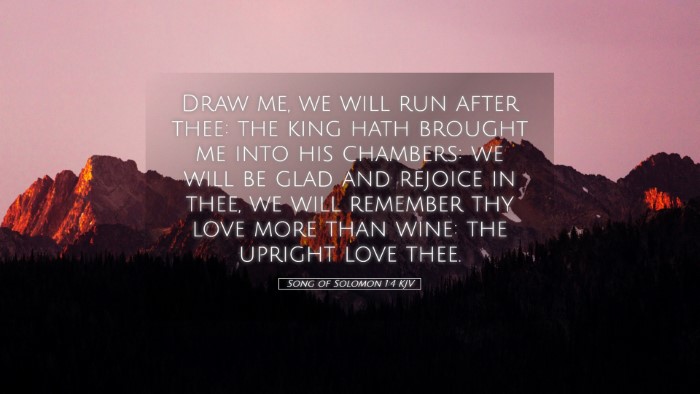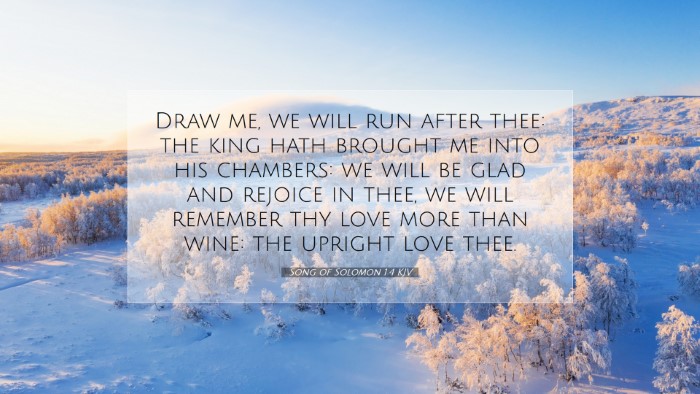Commentary on Song of Solomon 1:4
Verse: "Draw me after you, let us run. The king has brought me into his chambers. We will exult and rejoice in you; we will extol your love more than wine; rightly do they love you."
Introduction
The Song of Solomon, also known as the Song of Songs, is a rich poetic work attributed to Solomon. It encapsulates themes of love, longing, intimacy, and communion. Among the verses, Song of Solomon 1:4 stands out as a profound expression of desire and the joyful anticipation of love. In this commentary, we will draw insights from various public domain commentaries to deepen our understanding of this text.
Verse Analysis
1. “Draw me after you, let us run”
This opening phrase reveals a complex interplay of desire and invitation. The speaker expresses a yearning to be drawn into a close relationship with the beloved. Matthew Henry notes that this reflects a longing for the beloved's presence, indicative of spiritual pursuit. The idea of "running" signifies enthusiasm and an active response to such attraction. It speaks not only to romantic feelings but can also symbolize the believer’s pursuit of God, seeking a deeper relationship.
2. “The king has brought me into his chambers”
In the cultural context, the 'chambers' symbolize intimacy and security. Albert Barnes emphasizes that these chambers reflect a place of privilege and nearness, indicating that the beloved has been granted access to the king's personal space. This metaphor resonates with the notion of believers being invited into a deeper fellowship with Christ, the King of Kings. It alludes to the themes of grace and redemption, where the unworthy are brought close by the initiative of the King.
3. “We will exult and rejoice in you”
The proclamation of exultation and rejoicing signifies a deep emotional and spiritual fulfillment that comes from this relationship. Adam Clarke comments on the joy inherent in love, highlighting that true love results in celebration and rejoicing together. The communal aspect ("we") denotes a shared experience of joy, illustrating that love fosters a community of believers who celebrate their relationship with each other and with God.
4. “We will extol your love more than wine”
This metaphor of wine represents pleasure, indulgence, and the richness of life. As Solomon elevates love above wine, it indicates the superiority of intimate relationships over earthly pleasures. Henry articulates that the intoxicating nature of love surpasses other forms of enjoyment, implying that true love, especially divine love, satisfies more profoundly than transient earthly pleasures.
5. “Rightly do they love you”
The concluding phrase affirms the authenticity and appropriateness of this love. There is an acknowledgment that such love is not only natural but also right in the context of the relationship. Barnes notes that love rooted in truth and righteousness is the highest form of affection, reflecting the purity and holiness expected in the relationship between God and His people. This forms a call for believers to align their affections with the holiness that their King embodies.
Theological Implications
The verse encapsulates a rich tapestry of love that can be applied both romantically and spiritually. It serves as a reminder that the love between God and His people mirrors the passionate, desiring love expressed in human relationships. The themes of pursuit, intimacy, rejoicing, and proper love serve as foundational pillars in both romantic and faith-based contexts.
- Divine Attraction: The call to be drawn signifies the profound mystery of grace, where God initiates a relationship with humanity.
- Intimacy with God: The invitation into the King's chambers reflects the believer's access to spiritual depth and personal communion with God.
- The Joy of Love: The shared joy emphasizes the communal aspect of faith, where the celebration of love strengthens communal ties.
- Love Above Earthly Pleasures: The comparison of love and wine highlights the transcendent nature of divine love, far surpassing temporal comforts.
- Authenticity in Affection: It calls believers to evaluate their love in light of truth and righteousness, encouraging a proper response to God's love.
Reflection for Pastors and Theologians
For pastors, the application of this verse may lie in emphasizing the nature of God's unconditional love and the call to respond actively. The charge is to invite congregants into a deeper relationship with God, akin to the intimate imagery presented in the text. For theologians, this verse provides fertile ground for exploring the nature of love in its various forms—romantic, communal, and divine—encouraging exploration of how such relationships reflect theological truths about God’s character.
Conclusion
Song of Solomon 1:4 ultimately serves as an invitation to embrace love on all levels, reflecting the divine nature of the relationship between God and humanity. It calls for a response of joy, intimacy, and mutual acknowledgment of love that transcends the ordinary. By understanding and applying the principles gleaned from this verse, pastors, students, and scholars can grasp the full depth of love as depicted in Scripture—a love that is rich, transformative, and divinely ordained.


